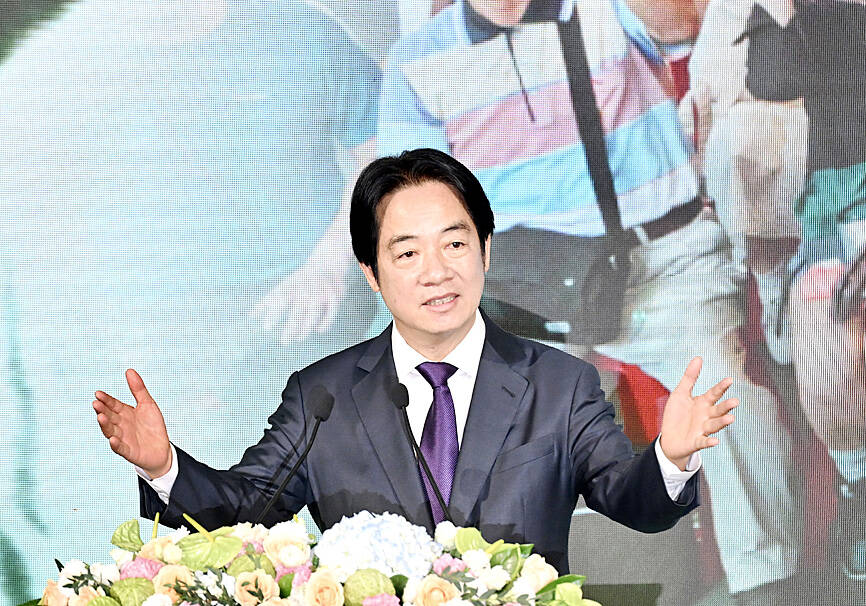Taiwanese have the right to build a democratic, sovereign nation based on the protection of human rights and freedom, President William Lai (賴清德) yesterday said in his keynote address at the Democratic Progressive Party (DPP) National Congress in Taipei.
Lai, who is also the DPP’s chairman, presented three key tasks for party members to focus on: bolstering national identity based on Taiwan sovereignty, deepening democratic values based on the constitutional framework and safeguarding human rights and freedom.
“Voters have handed the heavy responsibility of governing this country to the DPP, because they wish for the DPP to continue leading Taiwan into the future,” Lai said.

President William Lai speaks at the Democratic Progressive Party National Congress in Taipei yesterday.
Photo: Lo Pei-de, Taipei Times
“Taking control of government should not be for personal benefit, but to realize our shared ideals and values, to achieve them for our nation and its citizens,” he said.
“Taiwan is the mother for all of us, and we have the right to build our democratic ... nation,” Lai said.
Lai stressed the need to make a clean break from the past when Taiwan was under the authoritarian rule of the Chinese Nationalist Party (KMT).
“Taiwan’s democracy activists in the early years shed blood, with some sacrificing their lives to expose the lies — the KMT’s mistaken idea of ‘using Taiwan as a base to retake China,’” he said.
Now government policies that put Taiwan first must be implemented, Lai said.
“The DPP has the responsibility to unite the people, to oppose annexation by China and to safeguard national sovereignty,” he said.
The DPP would put all of its effort into ensuring Taiwanese to know their nation’s history and culture, “for the 23 million people of Taiwan to forge a collective national identity, [with] a common destiny in this homeland,” Lai said.
“We must ensure that national identity does not become the basis for outside forces to create internal strife and conflict,” he added.
Lai also reminded party members how the DPP was established during the 1980s.
“The DPP was born ... during the authoritarian one-party state era. The party founders insisted on clean politics and railed against corruption, holding onto the spirit of loving this homeland of ours, and standing together with the common people,” Lai said.
“In doing so, we ... challenged martial law, breaking through the KMT government’s ban against establishing new political parties and the ban against newspapers and media,” he said, referring to publications that were not under state control.
Together with democracy advocates, the DPP fought for 100 percent freedom of expression, and pushed for parliamentary reforms, to phase out legislators elected to represent provinces of China and have more representatives of cities and counties of Taiwan, Lai said, adding that the party also demanded that people should vote directly for the president.
At the congress, party members would vote to elect new executives, and place new members on party committees, Lai said.
“This means the DPP is officially entering into a new era, during a time when Taiwan is facing greater challenges from within and from external forces,” he said.
“We expect the party’s new working teams to take up this greater burden... We must unite to exert power and strength at critical times to lead Taiwan forward on the path of democracy,” he said.
Former president Tsai Ing-wen (蔡英文) did not attend the congress yesterday as she had a personal commitment.
Almost all of the party’s major members were present, including former president Chen Shui-bian (陳水扁).
Source: Taipei Times - 2024/07/22




















